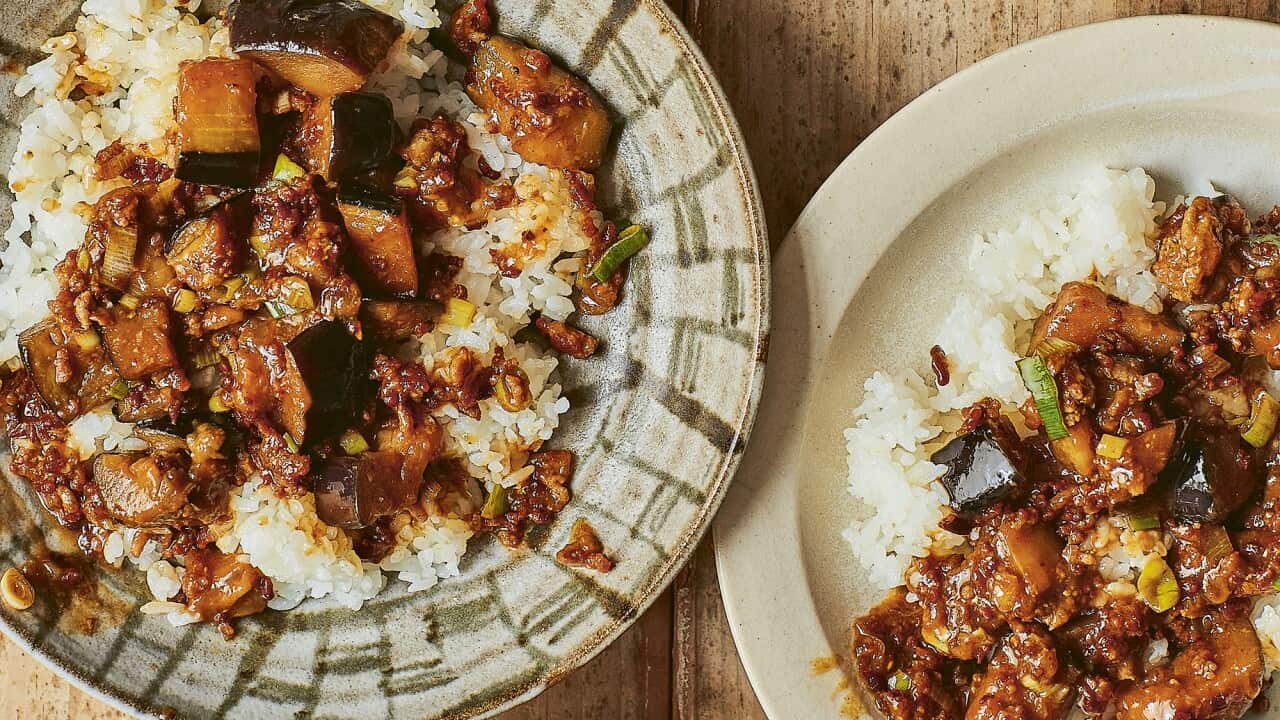serves
4
prep
10 minutes
cook
25 minutes
difficulty
Easy
serves
4
people
preparation
10
minutes
cooking
25
minutes
difficulty
Easy
level
Ingredients
- 3 tsp neutral oil, such as rapeseed (canola) or sunflower, or more as needed
- 100 g (3½ oz) pork mince (ground pork)
- 4 small eggplants (aubergines), or 100 g (3½ oz) firm tofu, cut into cubes
- 1 garlic clove, finely grated
- 2 cm (¾ in) fresh root ginger, finely grated
- ½ negi or spring onion (scallion), finely sliced (see Note)
- 1 tsp cornflour (cornstarch)
- 1 tsp toasted sesame oil
- Steamed rice, to serve
For the sauce
- 3 tsp brown miso
- 1 tbsp doubanjiang (chilli bean paste)
- 1 tsp soy sauce
- 1 tsp sugar
- 1 tsp powdered chicken stock or vegetable stock
Instructions
- For the sauce, put the miso, doubanjiang, soy sauce, sugar and powdered stock in a bowl with 200ml (7fl oz/scant 1 cup) water, mix well and set aside.
- Heat the oil in a frying pan (skillet) over a medium heat. Add the pork and cook, stirring, until browned and crispy and the fat has rendered out, about 5 minutes. Transfer the pork to a plate using a slotted spoon, leaving the oil behind in the pan.
- Add the eggplant and cook gently, turning until browned all over and meltingly tender, about 6–8 minutes. Add a touch more oil to the pan, if needed.
- Return the pork to the pan and add the garlic and ginger. Stir gently so as not to break up the aubergines and cook for 2–3 minutes until fragrant. Stir the sauce mixture into the pan and let it simmer for 2–3 minutes, then add the negi and cook for a further 5 minutes until the sauce has reduced.
- Mix the cornflour with 2 tablespoons of water and add to the pan, mixing gently. Let it simmer for 2–3 minutes until thickened, then stir in the sesame oil. Serve immediately alongside a pile of steamed rice.
Note
- This is a strong contender for weekly dinner rotations, depending on what you have in your fridge. I love the combination of pork mince and eggplant, but it works well with tofu – or make it vegetarian or vegan by omitting the meat and using tofu or vegan mince and substituting vegetable stock powder.
- Negi are a type of Japanese spring onion. If you can’t find them, use spring onions (scallions) instead. Doubanjiang, also called fermented chilli bean paste or spicy bean paste, is a fiery, savoury paste made from fermented broad (fava) beans. You can find it in Asian supermarkets and in many Western supermarkets.
This is an edited extract from Umai by Millie Tsukagoshi Lagares, published by Quadrille. Photography by Lizzie Mayson and Lucy Laucht.
Cook's Notes
Oven temperatures are for conventional; if using fan-forced (convection), reduce the temperature by 20˚C. | We use Australian tablespoons and cups: 1 teaspoon equals 5 ml; 1 tablespoon equals 20 ml; 1 cup equals 250 ml. | All herbs are fresh (unless specified) and cups are lightly packed. | All vegetables are medium size and peeled, unless specified. | All eggs are 55-60 g, unless specified.

